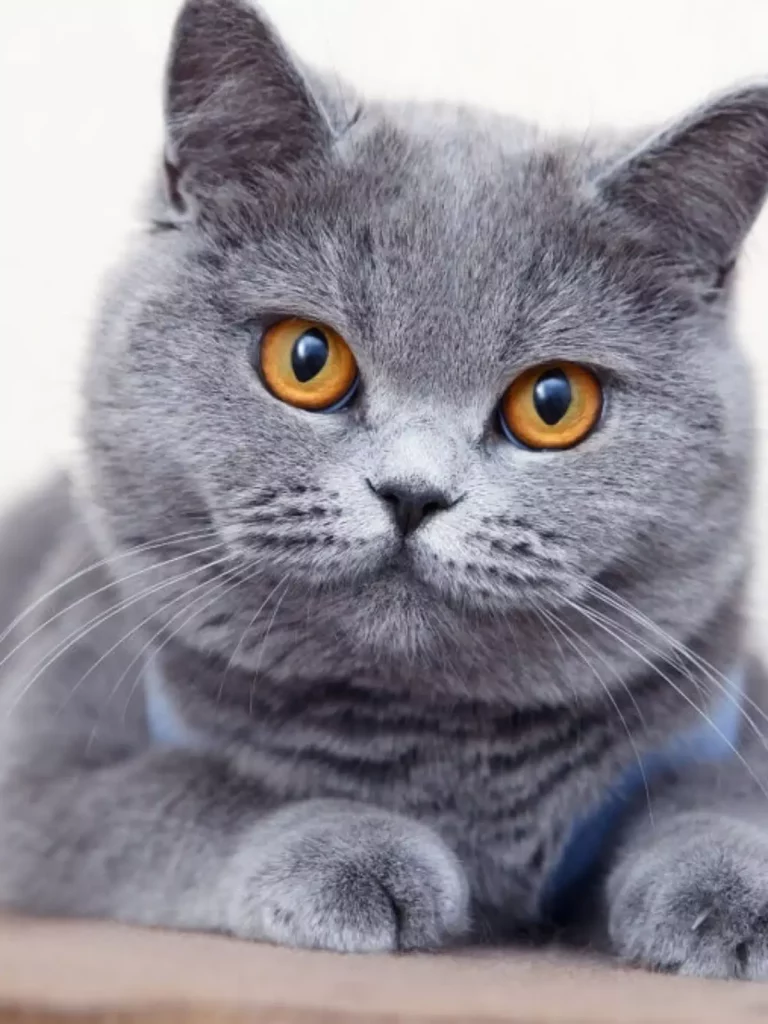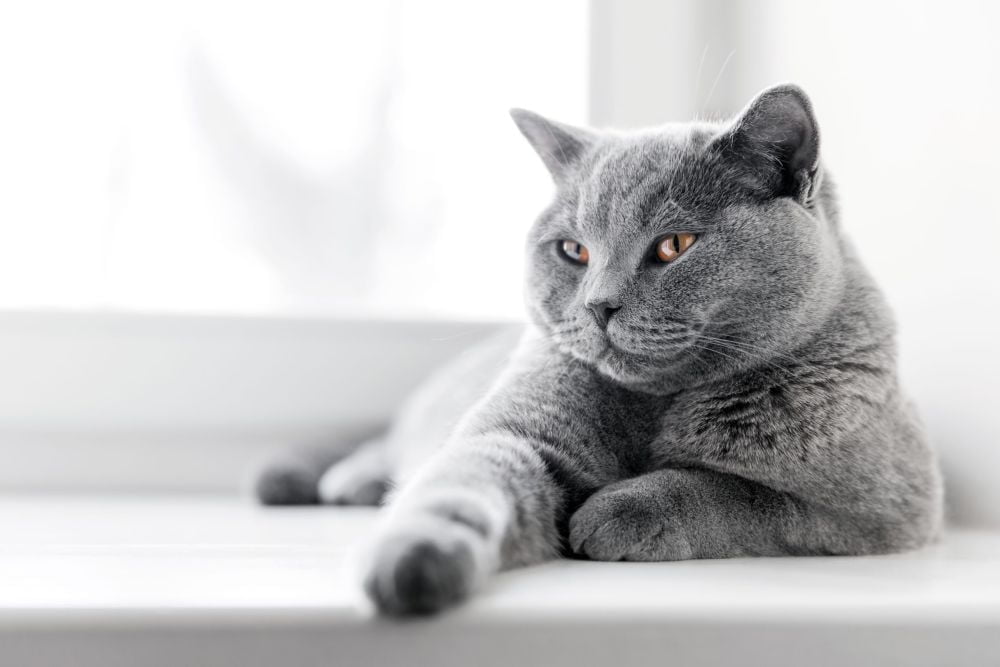
Known for its refined manners and exteriors, the British Shorthair represents the sophistication of the English upper class. Curiously, it is also one of the oldest cat breeds in the world – tracing its history as far back as 1 AD during the Roman Empire’s expansion to the British Isles.
Males seem to typify the easygoing English gentleman while the females exude propriety and lady-like etiquette.
In terms of appearance, the British Shorthair attracts potential cat owners with its robustness – stocky frame, round face, and short burly limbs.
Furthermore, it proudly wears a thick glossy velvet-like coat. This breed has become the inspiration for the magical Cheshire Cat in Alice of Wonderland.
According to Cat Time, the British Shorthair is the 12th most popular feline pet in the United States. If you fancy an embodiment of a Victorian caricature and the romanticized obesity that goes with it, examine how much you need to spend on its ‘noble stewardship’.

Contents
Average Cost of a British Shorthair
When it comes to the actual cost of buying a British Shorthair, prospective owners need to know the two major sources that define a realistic price range. It is not unusual for registered breeders in the United States to charge as much as $2,250 for an adult cat.
Unregistered breeders such as the 7-year old nondescript cattery called Alpha British Shorthair Kittens charge $350 per kitten aged around 10 to 11 weeks old. This flat cost already includes the shipping fee.
If you fancy other unregistered breeders, expect the price range to be anywhere below a thousand bucks.
How Much is Too Much?
Judging from which breeder type, one can always have a realistic gauge of the British Shorthair price. The trick is simply verifying the credentials of the cattery.
It is crucial to go through one that has its own legit website with traceable contact details. There are countless directories (e.g. Hoobly Classifieds) that advertise the sale of British Shorthair kittens.
Some of the buying costs get tricky as they may feature an indefinite number of kittens for a flat fee. In other cases, it is practically impossible to determine the age given the vague thumbnail images alone.
Lastly, important details tend to get very sketchy at best and monetary numbers may seem ultimately irrelevant, given the risk of dealing with questionable online sellers in the first place.

Looking for Registered Breeders
There are two major cat registries based in the United States with services that also offer worldwide coverage – The Cat Fancier’s Association (CFA) and The International Cat Association (TICA).
Here is an example of TICA-approved catteries that have both signed their code of ethics and specialized in producing purebred British Shorthairs:
- Arkansas
- Cats of the Ozarks
- Fortis Fortuna
- California
- Cats Kingdom USA
- Precious Brits CA
- Colorado
- Imagine
- Rejinald
- Florida
- Gigi Silver Brits
- Iowa
- Clover Cattery
- Illinois
- Loretta British
- Maryland
- Britland
- Massachusetts
- Scottish Kingdom Cats
- New York
- Fruitful
- Laziblues
- North Carolina
- Best Meowmeow
- Ohio
- Winterlight
- Oregon
- McSmitten Kittens
- Pennsylvania
- Blue Duchess Cats
- Texas
- Smiling British Shorthair
- Virginia
- Catnificent
- Washington
- Cheshire Lady
- McSmitten Kittens
- Silver Tales
One of the most important conditions that qualify a cattery in TICA standards is a solid guarantee of excellent health. Prior to leaving the cattery, this code of ethics requires breeders to spay/neuter the kittens before 12 months of age and inoculate them twice against Panleukemia, Rhinotracheitis, and Calicivirus.
Save Cost, Adopt!
For some prospective cat owners, an unregistered breeder is as good as undergoing surgery from an unlicensed physician. Erring on the side of credibility is just too much a risk in terms of securing a good pedigree – not just in terms of appearance but also in overall condition.
If you aim to cut costs in acquiring a decent British Shorthair cat, adopting from shelters and foster homes is a more viable idea. These institutions are keen on rescuing abandoned cats.
According to Adopt-A-Pet, spending as little as $75 to $100 can help rescue a gorgeous but endangered British Shorthair from euthanasia.
Overall Living Expenses
The cost of purchasing or adopting a cat is just one part of the overall spending. You must consider the fact that owning a purebred like the British Shorthair requires spending consistently at an indefinite duration.
Remember, you are investing in the care of a dependent animal companion.
As kittens, the British Shorthair will physically grow in a span of 4 years. They are expected to live an average lifespan of 14 to 20 years. Such is the length of time required to pay for the following life aspects:
- Feeding
The exact cost of feeding a British Shorthair precisely reflects its ideal consumption. Cats consume around 6 ounces of wet food and 4/5 cup of dry food per day (4 lbs per month).
If you feed them raw meat, the prescribed volume would be 3.5 ounces per day.
- 16-lbs bag of dry food: roughly $37 (or $10 per month),
- A pack of 24 cans (3-oz each) of wet food: around $20 to $25
- Up to 3 lbs of raw meat (e.g. chicken breast fillets): $10 per month.
- Hygiene
Raising a cat means paying for its overall sanitary needs. A toilet for every domestic cat is comprised of two things: the litter and its container.
It also pays to afford felines some privacy in order to keep the call of nature less stressful:
- 40-lbs bag of cat litter: $10 to $50
- Enclosed litter box: less than $40
- High-tech self-cleaning litter robot: roughly $500
If you plan to take your beloved British Shorthair to a grooming station for a total makeover, expect to pay around $200 to $300. Otherwise, you can simply allot time and effort in keeping it well-groomed at all times with these tools:
- Hairbrush: $9
- Nail clipper: $15
- 8-ounce shampoo: $10
- Equipment
British Shorthairs are very prone to obesity and the lack of physical activity can easily take a toll on their health. It may cost money to give them something to play with.
Fortunately, you only need to spend once in their lifetime (until such items need to be replaced).
- Laser pointer: between $5 and $15 per piece.
- Modular platforms (e.g. cat tree, ladder, and bridge): less than $100.
Other than toys, you may also consider including items cats would need when you have to take them outdoors for an appointment. For one thing, British Shorthairs abhor being picked up or being held on your lap (they’re too ‘proper’ for such gestures).
Getting an enclosed carrier or stroller is a matter of necessity – requiring an average budget of roughly $25 to $100.
- Health
As mentioned earlier, the perks of purchasing purebred cats from certified breeders can guarantee a clean bill of health by the end of the transaction. Such a steep purchasing price range normally included the following:
- Basic vaccination: $154
- Neuter/Spay: $33/$51
Other than these initial medical services, it is also important to consider the yearly health examination fees. A nondescript vet clinic in Wisconsin called B2B charges the following fees for the following necessary exams:
- Annual/Wellness: $53
- Medical exam: $62
- Level 1 (for updated annual): $45
- Office visit with technician: $22
Based on the character profile of British Shorthairs, the possible need for emergency funds (relative to its odds for serious injuries and diseases) is slim at best. They prefer to be indoors and they are naturally laidback – for better or worse. Nonetheless, it pays to be prepared for the worst.
If you do not have several thousand dollars of savings for emergency treatments, you could avail for pet insurances that charge nominal fees per month. But before getting further into that, it is important to take note of the following preventive tests – especially considering the likelihood of your British Shorthair’s risk for the following diseases:
- Cardiac exam: $550 to $750
- Ultrasound: $60
- DNA test: $48
- Dental x-ray: $50 to $60
The British Shorthairs are naturally predisposed to a common heart disease called Hypertrophic Cardiomyopathy. While cardiovascular diseases are almost always a byproduct of unhealthy weight gain, this condition can be inherited from their direct ancestors.
It is best to have an obese British Shorthair commit to an ECG exam.
Another serious illness that British Shorthairs may inherit is a bleeding disorder called Hemophilia B. A simple DNA test will help identify carriers of this disease.
Unfortunately, this grave condition has no known treatment and symptoms can only be managed up to its terminal stage as per specific vet recommendations.
Polycystic Kidney Disease (PKD) is also very common among British Shorthair cats who share a very strong genetic connection with Persian ancestors. Confirming the diagnosis of this disease requires a DNA test and ultrasound.
Lastly, British Shorthairs also have a relatively higher chance of acquiring gingivitis. Despite belonging outside the category of flat-faced species (brachycephalic), this short-nosed pedigree’s facial structure seemed problematic for growing a healthy set of teeth.
A tooth extraction often follows after a dental X-ray.
